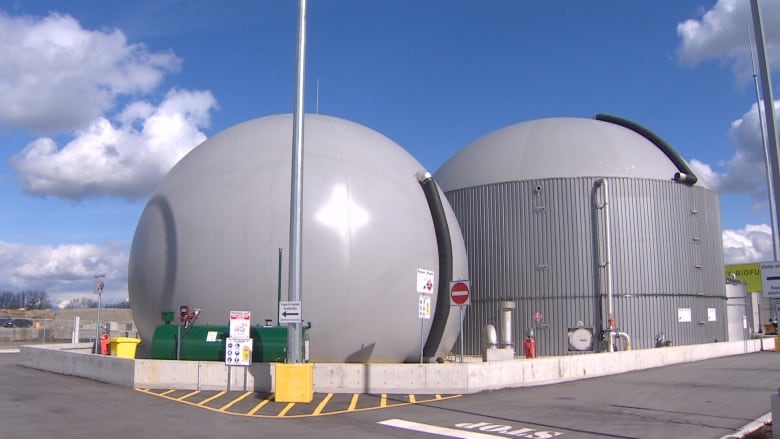Surrey, B.C. unveils 'state-of-the-art' biofuel plant, promises no foul smells
Facility will reduce the city's carbon footprint by up to 50,000 tonnes of greenhouse gases annually

Surrey garbage trucks will soon be running on fuel made from food scraps.
The city unveiled its new industrial-scale biofuel plant Friday, where organic waste will be converted into natural gas, fuelling the city's waste collection fleet.
The Surrey Biofuel Facility has capacity to transform up to 115,000 tonnes of organic waste into biofuel, according to the city.
At the grand unveiling Friday, Surrey Mayor Linda Hepner said it will reduce local greenhouse gas emissions by 50,000 tonnes per year.
"This state of the art, $68 million facility not only sets a new benchmark for sustainability in Canada, but it also has the distinction of being the first closed-loop fully integrated waste management system in all of North America," said Hepner at the ribbon-cutting ceremony.

Converted to natural gas
Food scraps and other organics picked up from curbs in Surrey will be transported to the new biofuel plant.
There, the waste is unloaded into a large, sealed anaerobic digester, where it breaks down over several weeks, producing biogas.

The biogas is then moved into an upgrader, where it is washed, compressed, and converted into natural gas.
The natural gas can then be used to power the city's waste collection fleet. Excess energy will be injected into the city's district energy system, which cools and heats Surrey City Centre.
The facility will also produce up to 45,000 tonnes of nutrient-rich compost-using waste from the biogas production.

Following Europe's lead
"This is important not only for the city, but for the region," said Robert Costanzo, general manager of corporate services for the City of Surrey.
"It's what cities should be doing, we're not looking at our waste any longer as landfill material — we're looking at it as renewable energy," he said, adding the plant will divert over 100,000 tonnes of waste from local landfills.
Costanzo said the city is looking to follow the European model with respect to biofuel production. There, the renewable energy source has become an increasingly popular substitute for traditional fuel.

Smell it later?
While production is just starting inside the facility, the city promises there will be no foul odours haunting the neighbourhood.
"It's a very sophisticated odour suppression system." said Costanzo. "Our goal is to not impact the property owner next door."
The facility uses a negative-air pressure system to draw all rotten odours from waste trucks indoors. Foul-smelling chemicals that arise from the biofuel production process are sealed and treated indoors.
"The system works so well that when you stand right outside the building envelope, you can't smell anything."
